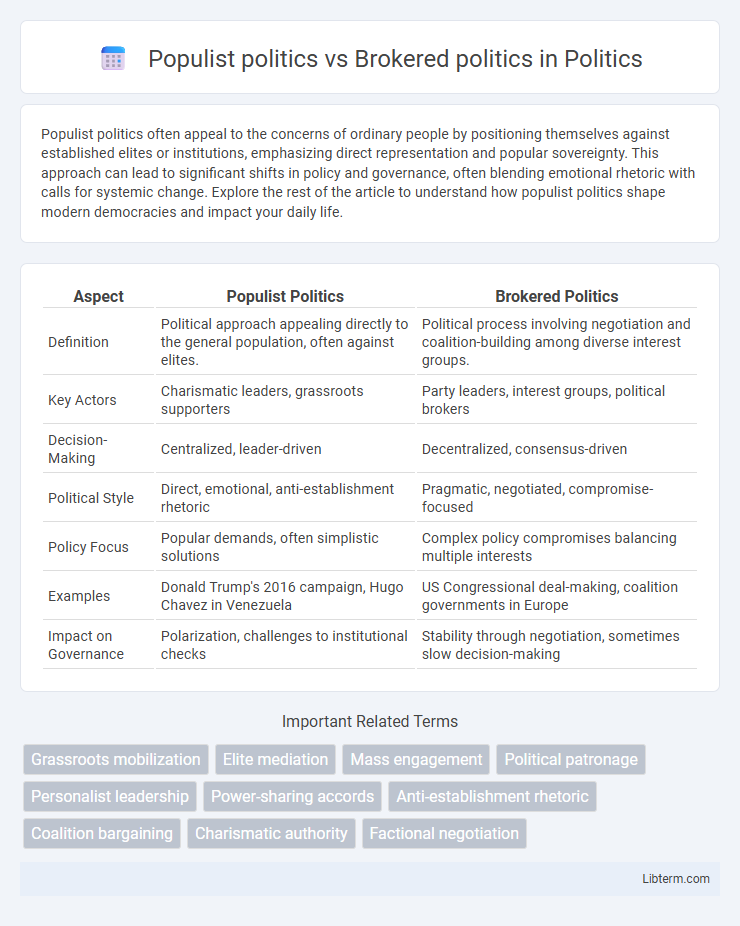Populist politics often appeal to the concerns of ordinary people by positioning themselves against established elites or institutions, emphasizing direct representation and popular sovereignty. This approach can lead to significant shifts in policy and governance, often blending emotional rhetoric with calls for systemic change. Explore the rest of the article to understand how populist politics shape modern democracies and impact your daily life.
Table of Comparison
| Aspect | Populist Politics | Brokered Politics |
|---|---|---|
| Definition | Political approach appealing directly to the general population, often against elites. | Political process involving negotiation and coalition-building among diverse interest groups. |
| Key Actors | Charismatic leaders, grassroots supporters | Party leaders, interest groups, political brokers |
| Decision-Making | Centralized, leader-driven | Decentralized, consensus-driven |
| Political Style | Direct, emotional, anti-establishment rhetoric | Pragmatic, negotiated, compromise-focused |
| Policy Focus | Popular demands, often simplistic solutions | Complex policy compromises balancing multiple interests |
| Examples | Donald Trump's 2016 campaign, Hugo Chavez in Venezuela | US Congressional deal-making, coalition governments in Europe |
| Impact on Governance | Polarization, challenges to institutional checks | Stability through negotiation, sometimes slow decision-making |
Introduction to Populist Politics and Brokered Politics
Populist politics centers on appealing directly to the masses by emphasizing popular sovereignty and often positioning the "people" against perceived elites or establishment figures. Brokered politics involves political actors negotiating and mediating among diverse interest groups to build coalitions and achieve consensus within institutional frameworks. Understanding these dynamics highlights the contrast between populism's direct mass mobilization and brokered politics' reliance on intermediary negotiation.
Historical Roots of Populism and Brokered Approaches
Populist politics trace their roots to 19th-century agrarian movements, emphasizing direct appeal to "the people" and often challenging established elites, as seen in the People's Party of the 1890s in the United States. Brokered politics emerge from pluralistic political systems where multiple interest groups and intermediaries negotiate and compromise, reflecting the dynamics of party machines and political patronage evident in early 20th-century urban politics. These historical foundations shape populism's confrontational style and brokered politics' emphasis on consensus-building and coalition management.
Core Principles of Populist Politics
Populist politics centers on the core principle of representing the "common people" against a perceived corrupt elite, emphasizing direct appeals to popular sovereignty and anti-establishment rhetoric. It prioritizes simple solutions to complex problems, often promoting nationalism and economic protectionism to resonate with disenfranchised groups. Unlike brokered politics, which relies on negotiation and compromise among diverse interests, populism seeks to bypass traditional intermediaries to champion a unified, often polarizing, voice of the majority.
Key Features of Brokered Politics
Brokered politics centers on negotiation and compromise among multiple parties or factions, often involving intermediaries who facilitate agreements to form coalitions. Key features include the reliance on deal-making, power-sharing arrangements, and strategic alliances to achieve policy goals or government formation. This approach contrasts with populist politics by emphasizing pragmatism and consensus-building over direct appeals to popular sentiment.
Leadership Styles: Populists vs Power Brokers
Populist leaders emphasize direct connection with the masses, often using charismatic appeal and simplified messaging to mobilize broad public support. Power brokers rely on strategic negotiation, coalition-building, and insider influence to navigate political institutions and secure decisions. While populists seek legitimacy through popular mandate, power brokers gain authority via behind-the-scenes deal-making and control over political resources.
Impact on Democratic Institutions
Populist politics often challenge democratic institutions by promoting direct appeals to "the people" and undermining intermediary bodies such as parties and legislatures, which can weaken checks and balances. Brokered politics relies on negotiated compromises among diverse interest groups and political actors, fostering institutional cooperation and stability. The impact on democratic institutions is significant as populism may erode institutional trust and polarization, whereas brokered politics tends to reinforce pluralism and governance through consensus-building.
Voter Engagement and Mobilization Differences
Populist politics often thrives on direct voter engagement by appealing to widespread dissatisfaction and using emotionally charged, anti-establishment rhetoric that mobilizes grassroots support. In contrast, brokered politics relies heavily on intermediary actors such as political parties and interest groups to negotiate and mobilize voters through coalition-building and targeted incentives. While populist movements drive mass participation by simplifying complex issues, brokered politics prioritizes strategic alliances and controlled voter mobilization within established political frameworks.
Policy Formulation: Direct vs Negotiated
Populist politics emphasize direct policy formulation by mobilizing mass support and bypassing traditional political institutions to implement grassroots-driven agendas. Brokered politics rely on negotiated policy formulation, involving compromise and consensus-building among diverse interest groups and political elites. The contrast highlights populism's focus on unilateral decision-making versus brokered politics' emphasis on collaboration and political mediation.
Strengths and Weaknesses of Each Model
Populist politics excels in mobilizing mass support by directly appealing to popular sentiments and challenging established elites, though it risks oversimplifying complex issues and fostering polarization. Brokered politics benefits from negotiation and compromise among diverse interest groups, promoting stability and incremental policy-making, yet it may lead to diluted policies and lack of decisive action. Both models embody trade-offs between responsiveness and governance effectiveness, influencing democratic representation differently.
The Future Trajectory: Populism or Brokered Politics?
The future trajectory of politics appears to pivot between the rise of populist movements, which leverage direct public appeal and often challenge traditional institutions, and brokered politics, characterized by negotiated compromises within established political frameworks. Populism gains momentum through social media influence and grassroots mobilization, disrupting conventional party structures, while brokered politics relies on coalition-building and pragmatic policymaking. Understanding the evolving dynamics between these forces is essential for anticipating how governance and political representation will adapt in the coming decades.
Populist politics Infographic

 libterm.com
libterm.com